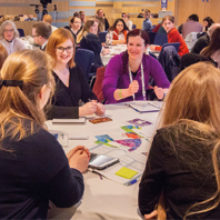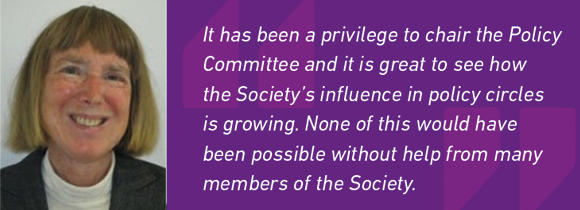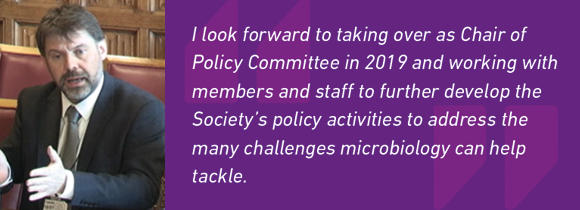Progressing Policy at the Society
Issue: HIV and AIDS
06 November 2018 article

Dr Pat Goodwin (Chair) and Professor Paul Kellam (Chair-Elect) of the Microbiology Society’s Policy Committee reflect on progress in enabling members to engage with policy-makers and champion microbiology.
It is increasingly evident that scientists have an important role to play in informing and interacting with government, politicians and other key stakeholders involved in making and implementing policies. Brexit, science funding, antimicrobial resistance and food security are just some of the issues we have come across in our roles as Chair and Chair-Elect of the Microbiology Society’s Policy Committee.
Putting our expert members at the heart of policy activities
The Society recognises that it has a vital role to play in providing a voice for microbiology and enabling members to connect and communicate with decision-makers. Indeed, policy work is fundamental to progressing the Society’s strategic vision of ‘a world in which the science of microbiology provides maximum benefit to society’. To help deliver this vision the Society will:
• empower members to engage in science policy, providing opportunities to stay up-to-date with policy developments, become involved in policy activities and build networks relevant to their work;
• inform policy, using the collective expertise of members to ensure that policy-makers are aware of the need for, and take account of, microbiological evidence in addressing policy issues;
• champion microbiology, increasing awareness and understanding of the public value of microbiology, our members’ work, and the role of microbiology in addressing global challenges.

Engaging in science policy
Empowering members to input into our policy work is essential for the Society to have the authority and breadth of expertise to speak on behalf of the microbiology community and effectively inform policy. Our first Engaging in Science Policy session at Annual Conference 2018 attracted a lot of interest, and we aim to follow this up with further events and resources.
In June, we both attended Parliamentary Links Day in the Houses of Parliament, together with several other members and our guest, the Head of the Parliamentary Office of Science and Technology. Events like this raise the profile of microbiology and enable members to engage directly with policy-makers.
Informing policy
Policy workshops, allowing face-to- face discussions between members and stakeholders, are another way we enable members to inform policy activities and expand their networks. This approach proved very successful in producing our Unlocking the Microbiome policy report. We connected scientists, funders and other stakeholders spanning areas such as health, agri-food and biotechnology, and made 10 recommendations to help the research community communicate the practical, educational, industrial and policy aspects of microbiome research. Feedback from funders indicated that they found the report useful, and it was discussed in a parliamentary POST Note on The Microbiome and Human Health and in Science in Parliament magazine – evidence that we are having an impact.
The Society has also been active in responding to policy consultations, thereby informing reports which make recommendations to Government. Notably, this year we were invited to give evidence at Parliamentary Select Committee hearings on the Life Science Industrial Strategy and Science, and Brexit. At both hearings, Paul presented the views of the Society, based on input from members.

Championing microbiology
Antimicrobial resistance (AMR) is an important policy issue which demonstrates various ways in which the Society can champion microbiology. First, it is the subject of one of our policy briefings . Second, as a member of the Learned Society Partnership on AMR we have supported several interdisciplinary events, including a workshop for early career researchers; and thirdly, we have a representative on the Chief Medical Officer’s AMR Health Stakeholder Group which informs the development of the UK AMR strategy.
Looking forward to the Society’s 75th Anniversary, Policy Committee will be overseeing a project exploring how microbiology can contribute towards implementing the Sustainable Development Goals (SDGs) and we hope that many members will be able to input into this.
Further information
More information about our policy activities can be found on our website. If you wish to become more involved please sign up to the science policy mailing or contact the Policy Team.
Microbiology Society Strategy 2018–2022
‘Engaging in Science Policy’ article
Antimicrobial Resistance Policy Project
Learned Society Partnership on Antimicrobial Resistance
